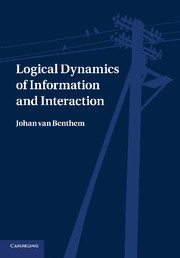Book contents
- Frontmatter
- Contents
- Preface
- Acknowledgments
- 1 Logical dynamics, agency, and intelligent interaction
- 2 Epistemic logic and semantic information
- 3 Dynamic logic of public observation
- 4 Multi-agent dynamic-epistemic logic
- 5 Dynamics of inference and awareness
- 6 Questions and issue management
- 7 Soft information, correction, and belief change
- 8 An encounter with probability
- 9 Preference statics and dynamics
- 10 Decisions, actions, and games
- 11 Processes over time
- 12 Epistemic group structure and collective agency
- 13 Logical dynamics in philosophy
- 14 Computation as conversation
- 15 Rational dynamics in game theory
- 16 Meeting cognitive realities
- 17 Conclusion
- References
- Index
13 - Logical dynamics in philosophy
Published online by Cambridge University Press: 07 October 2011
- Frontmatter
- Contents
- Preface
- Acknowledgments
- 1 Logical dynamics, agency, and intelligent interaction
- 2 Epistemic logic and semantic information
- 3 Dynamic logic of public observation
- 4 Multi-agent dynamic-epistemic logic
- 5 Dynamics of inference and awareness
- 6 Questions and issue management
- 7 Soft information, correction, and belief change
- 8 An encounter with probability
- 9 Preference statics and dynamics
- 10 Decisions, actions, and games
- 11 Processes over time
- 12 Epistemic group structure and collective agency
- 13 Logical dynamics in philosophy
- 14 Computation as conversation
- 15 Rational dynamics in game theory
- 16 Meeting cognitive realities
- 17 Conclusion
- References
- Index
Summary
Logical dynamics is a way of doing logic, but it is also a general stance. Making actions, events, and procedures first-class citizens enriches the ways in which logic interacts with philosophy, and it provides a fresh look at many traditional themes. Looking at logic and philosophy over the last century, key topics like quantification, knowledge, or conditionality have had a natural evolution that went back and forth across disciplines. They often moved from philosophy to linguistics, mathematics, computer science, or economics – and sometimes back to philosophy (cf. van Benthem 2007e). In the same free spirit, this book has studied the logical dynamics of intelligent agency drawing on several disciplines, and the final chapter sequence explores some interfaces in more detail. We start with philosophy, again disregarding boundaries, moving freely between epistemology, philosophy of information, philosophy of action, or philosophy of science.
This chapter discusses a number of philosophical themes that emerge on a dynamic stance, and tries to convey how fresh, but also how radical, logical dynamics can be in its way of dealing with existing issues. We start with a small pilot study on the Fitch Paradox of knowability. Then we move to general epistemology, articulating a view of knowledge as dynamic robustness under various informational processes. This raises a further issue, now in the philosophy of information, namely, what information is, even within the restricted compass of logic. We find several legitimate and complementary notions whose interplay is crucial to rational agency. This leads to the issue of natural mixtures of different notions of information and actions that manipulate them, and we cross over to the philosophy of mathematics, studying intuitionistic logic with dynamic-epistemic tools as a mixture of factual and ‘procedural’ information. Still, intuitionistic logic and indeed most information and process-oriented logics leave the agents doing all these things out of the picture. We go on to a basic issue in the philosophy of action, and ask ourselves what a rational agent really is, proposing a list of core features on an analogy with the analysis of computation in Turing machines. Having done that, we consider whether the resulting logical dynamics of common sense agency also applies to the more exalted domain of science, discussing some issues in the philosophy of science in this light. Finally, we raise the question of what all this means for logic itself. We compare logical dynamics with logical pluralism, a recent position in the philosophy of logic that reflects on what modern logic has become. We emphasize the characteristic features of the dynamics in this book, and what these entail for our understanding of what the field of logic is, or might become.
- Type
- Chapter
- Information
- Logical Dynamics of Information and Interaction , pp. 268 - 302Publisher: Cambridge University PressPrint publication year: 2011



